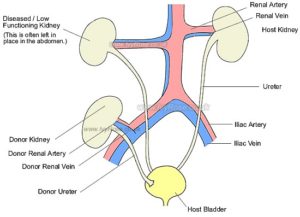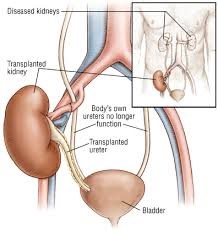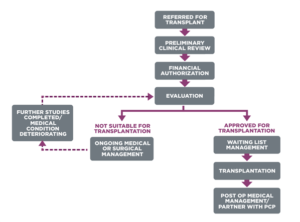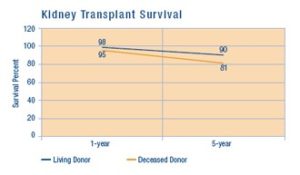A brief about kidney transplantation:
When kidney failure becomes very advanced, your kidneys are so damaged they can no longer do their job. A transplant is a treatment for kidney failure but it is not a cure.
A transplant potentially offers a more active life and a longer life, free from dialysis as well as dietary restrictions. However, your new kidney needs a lifetime of care.
Kidney transplants come from living or deceased donors. The person getting the kidney is the recipient and the person giving the kidney is the donor. Living donors can be relatives as well as partners and close friends. Deceased donors are people who have decided to donate their organs after death.
Who can have transplantation?
You can have a transplant if you are medically suitable and stable if on dialysis. If the transplant is from a living donor, the operation can often be done before dialysis starts. Unfortunately not everyone is suitable to have a transplant. If you have other major medical problems, dialysis may be a better treatment.
Factors affecting your suitability include:
- Agreement with the idea of transplantation,
- General health, apart from kidney failure,
- Willingness to go through with the tests and operation,
- Willingness to undertake the lifelong medication treatment.
Normal Kidney Function
The kidneys are organs whose function is essential to maintain life. Most people are born with two kidneys, located on either side of the spine, behind the abdominal organs and below the rib cage. The kidneys perform several major functions to keep the body healthy.
Filtration of the blood to remove waste products from normal body functions, passing the waste from the body as urine, and returning water and chemicals back to the body as necessary.
Regulation of the blood pressure by releasing several hormones. Stimulation of production of red
blood cells by releasing the hormone erythropoietin.
The normal anatomy of the kidneys involves two kidney bean shaped organs that produce urine. Urine is then carried to the bladder by way of the ureters. The bladder serves as a storehouse for the urine. When the body senses that the bladder is full, the urine is excreted from the bladder through the urethra.
Donate a kidney:
Living Donors
Kidneys for transplant come from a living donor or a deceased (cadaver) donor. When a kid ney is transplanted from a living donor, the donor’s remaining kidney enlarges to take over the work of two. As with any major operation, there is a chance of complication. But kidney donors have the same life expectancy, general health and kidney function as others.
ney is transplanted from a living donor, the donor’s remaining kidney enlarges to take over the work of two. As with any major operation, there is a chance of complication. But kidney donors have the same life expectancy, general health and kidney function as others.
Any healthy person can safely donate a kidney. The donor must be in excellent health, well informed about transplantation and able to give informed consent.
Cadaveric Donors
A cadaveric kidney comes from a deceased donor. The Uniform Anatomical Gift Act allows us to donate organs for transplant when we die and allows our families to provide permission as well. All donors are carefully screened to prevent disease transmission.
If you decide to undergo a cadaveric kidney transplant and you’re medically eligible, your name will be placed on a cadaver waiting list. A blood sample for antibody level will be sent monthly to the medical centre. The waiting period for a cadaver kidney depends upon the availability of a cadaver donor compatible with your blood type and your antibody level.
When a kidney becomes available, your referring kidney specialist is contacted for approval. The transplant service will verify that you have no recent infections or medical problems that would interfere with a safe transplant. We will assist you in making arrangements for your transplant.
Kidney Diseases
When the kidneys stop working, renal failure occurs. If this renal failure continues (chronically), end-stage renal disease results, with accumulation of toxic waste products in the body. In this case, either dialysis or transplantation is required.
Common Causes of End-Stage Renal Disease
- Diabetes mellitus
- High blood pressure
- Glomerulonephritis
- Polycystic Kidney Disease
- Severe anatomical problems of the urinary tract
The Matching Process
During your evaluation for a transplant, you’ll have blood tests to determine your blood type (A, B, AB, or O) and your human leukocyte antigen (HLA). HLA is a group of antigens located on the surface of your white blood cells. Antigens are responsible for your body’s immune response. If your HLA type matches the donor’s HLA type, it’s more likely that your body will not reject the kidney. Each person has six antigens, three from each biological parent. The more antigens you have that match those of the donor, the greater the chance of a successful transplant.
Once a potential donor has been identified, you’ll need another test to make sure that your antibodies won’t attack the donor’s organ. This is done by mixing a small amount of your blood with the donor’s blood.
The transplant can’t be done if your blood forms antibodies in response to the donor’s blood. You have what is called a “negative cross match” if your blood shows no antibody reaction. This means that the transplant can proceed.
Phases of Transplant
Pre-transplant Period
This period refers to the time that a patient is on the deceased donor waiting list or prior to the completion of the evaluation of a potential living donor. The recipient undergoes testing to ensure the safety of the operation and the ability to tolerate the anti-rejection medication necessary after transplantation. The type of tests varies by age, gender, cause of renal disease, and other concomitant medical conditions. These may include, but are not limited to:
- General Health Maintenance: general metabolic laboratory tests, coagulation studies, complete blood count, colonoscopy, pap smear and mammogram (women) and prostate (men)
- Cardiovascular Evaluation: electrocardiogram, stress test, echocardiogram, cardiac catheterization
- Pulmonary Evaluation: chest x-ray, spirometry
Potential Reasons of Excluding Transplant Recipient
- Uncorrectable cardiovascular disease
- History of metastatic cancer or ongoing chemotherapy
- Active systemic infections
- Uncontrollable psychiatric illness
- Current substance abuse
- Current neurological impairment with significant cognitive impairment and no surrogate decision maker.
Transplant Surgery
Your surgery may last from two to four hours. During the operation, the kidney is placed in your pelvis rather than the usual kidney location in the back. (Your own kidney will not be removed.) The artery that carries blood to the kidney and the vein that removes blood from it are surgically connected to two blood vessels in the pelvis. The urethra, or tube that carries urine from the kidney to the bladder, is transplanted through an incision in the bladder.
After the operation, you will remain in the recovery room for a few hours and then return to the Kidney Transplant Unit. The surgeon will inform your family when the procedure is over.
You will be encouraged to get out of bed 12 to 24 hours after surgery and walk as much as you c an. Nurses will instruct you in taking your medications explain the side effects and discuss making lifestyle changes.
an. Nurses will instruct you in taking your medications explain the side effects and discuss making lifestyle changes.
A cadaver kidney transplant sometimes will be temporarily slow in functioning, a condition called a “sleepy” kidney or acute tubular necrosis (ATN). You may need to undergo dialysis a few times. A “sleepy” kidney usually starts working in two to four weeks.
Most transplant recipients must take medication called immunosuppressants to prevent rejection of the transplanted organ. One of the side effects of these anti-rejection drugs is an increased risk for cancer, particularly skin cancer and lymphoma. You should be closely monitored for these conditions.
After Surgery:
After surgery you will feel groggy, uncomfortable and have an oxygen mask. A dressing will cover your operation site. The intravenous line remains in place so fluid can be given until you can eat. You will be given medication to help with the pain. A physiotherapist will give you an exercise plan. It is important to do the coughing, breathing and leg exercises to minimise the risk of a chest infection and clots in your legs after surgery. You may be uncomfortable at first but this is normal. Some people produce urine immediately after the transplant. However, others require dialysis for a short time until the new kidney begins to function. This does not mean it will not work, just that it needs time to recover. Daily blood tests are taken to check the function of your new kidney and find any early signs of rejection. Your hospital stay can vary but is usually 3–10 days.
It depends on your fitness, response to the new kidney and whether any problems arise. Befo re leaving hospital, an appointment is arranged with the surgeon and regular reviews with the kidney specialists to check on your recovery. After returning home, you need to take life easy. It is important not to lift anything heavy for the first 6–8 weeks. You may feel tired and need more sleep — it is important to listen to your body and not rush your recovery or do any activities that make you feel uncomfortable. At the same time it is important to gradually build up your physical activity to maintain fitness and well-being.
re leaving hospital, an appointment is arranged with the surgeon and regular reviews with the kidney specialists to check on your recovery. After returning home, you need to take life easy. It is important not to lift anything heavy for the first 6–8 weeks. You may feel tired and need more sleep — it is important to listen to your body and not rush your recovery or do any activities that make you feel uncomfortable. At the same time it is important to gradually build up your physical activity to maintain fitness and well-being.
What Are the Risks of a Kidney Transplant?
A kidney transplant is a major surgery. Therefore, it carries the risk of:
- an allergic reaction to general anaesthesia
- bleeding
- blood clots
- a leakage from the urethra
- a blockage of the urethra
- an infection
- rejection of the donated kidney
- failure of the donated kidney
- a heart attack
- a stroke
What medication is needed?
After a transplant, immunosuppressive drugs are taken for the rest of your life. Your combination is carefully selected to give your transplant the best chance of success. Each drug has benefits and risks. You may get side effects from these drugs.
Many of them do not last and are related to dosage, including:
Puffiness and rounding of the face and body, increased appetite and weight gain, Mood swings, acne , muscle weakness , hand tremors , upset stomach , indigestion , diarrhoea ,overgrowth of the gums and gum infections .
Other side effects are more serious such as:
Raised blood pressure, increased risk of infection, increased risk of cancer, particularly skin cancer, high blood sugar levels, high cholesterol levels, altered blood count, kidney damage, weakening of the bones.
It is important to talk to your doctor or pharmacist about your medications to get advice about:
When and how to take your medication, avoidance of missed doses ,side effects , storage and care of medications , possible dietary restrictions , interactions with other medications.
Transplant Success Rates
The success rate of kidney transplantation varies depending on whether the do nated oran is from a living donor or a deceased donor as well as the medical circumstances of the grecipient. Kidneys from living donors generally last longer. Most kidney losses are due to rejection, but infections, circulation problems, cancer, and return of the original kidney disease can also cause kidney loss.
nated oran is from a living donor or a deceased donor as well as the medical circumstances of the grecipient. Kidneys from living donors generally last longer. Most kidney losses are due to rejection, but infections, circulation problems, cancer, and return of the original kidney disease can also cause kidney loss.
